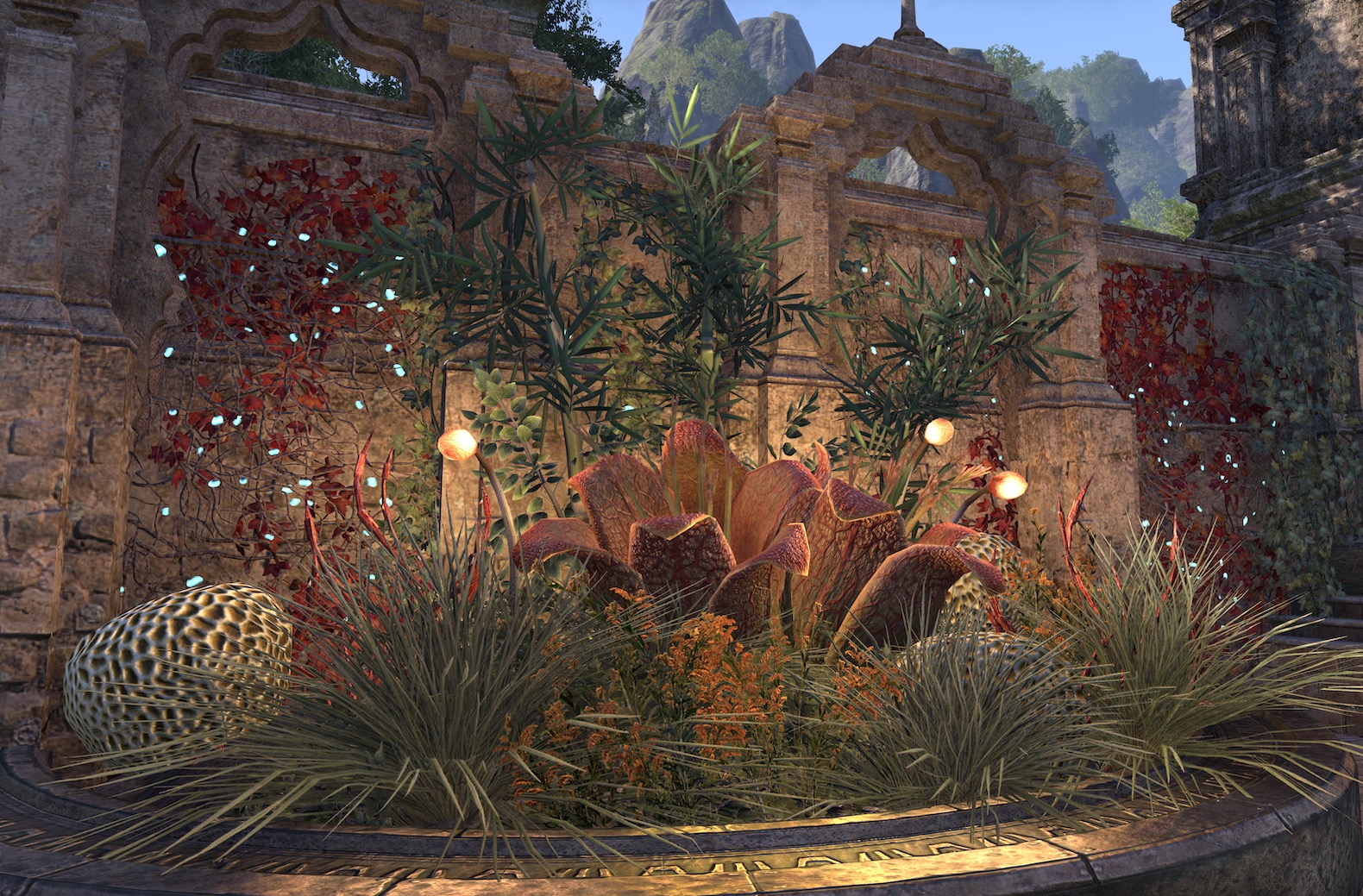Perfectly Humble


A quick guide to finding and harvesting materials for personal use, or to bring in some gold.

Making the profits: Guild Traders
Once you’ve collected materials or created items, it’s time to sell them. Guild traders offer an efficient way to exchange your items for other players’ gold.
Some guilds are explicitly trading guilds and work very hard to have a trader every week. Many social guilds try to keep a trader, but traders are bid on weekly and not all guilds have the exorbitant amount of gold necessary to consistently win a trader.
Trader “turnover” is every Tuesday afternoon. Most guilds place bids on several traders as a backup plan so locations may change periodically. If your guild retains same trader, cool. Nothing changes. If your guild wins the bid on a trader in another location, your items travel to the new place. The only downside to new trader locations is updating your listings on the Tamriel Trade Centre (TTC) website. I highly recommend scanning the new trader as soon as possible to ensure anyone looking at TTC knows where they can buy your items. More about scanning traders below under Up & Running.
When the guild has a trader, all members have 30 slots per account for listing sellable items. If items do not sell within 30 days, the listing expires and is returned to you via the in-game system mail. Listing fees are not refunded. Ever.
You may cancel a listing at any time prior to the item selling. The item is returned via system mail. The 1% listing fee is not returned. See above.
Ah, yes - fees. Total fees are 8% of listing price. Listing an item requires 1% of the item price up front. It's taken immediately from the gold in your character’s inventory. Not enough gold to list? No listing.
The other 7% of fees goes to the guild and its deducted at the time of the sale. That 7% helps the guild recover the original cost of the trader, which can be upwards of several million gold each week, depending on location.
Once item is purchased, you will recieve an in-game mail with your cut: sale price minius the 7% fee.
An item listed for 1,000 gold will cost 10 gold to list. Once the item sells, you'll recieve 930 gold in the mail.
Making the Profits: How to calculate profit
Making a profit from selling items, especially crafted items, requires a bit of planning. It's a simple, yet important process and can guarantee you’re making coin rather than working for free. The formula includes the listing fee because that is an upfront cost, just like the mats used to create the item.
Make sure you’ve priced items correctly using this simple formula with LP being the listing price:
To calculate the amount after the 8% fees, we multiply the LP by the total percentage that remains of the sale amount, which is 92% (Thank you middle school math class!).
Cost includes any materials used to craft the item or purchase the original item, if any.
(LP multiplied by .92) - cost (if any)
Example: 500 x .92 = 460 - 428 = 32 gold profit
Selling potions is a good way to bring in some coin, but the cost of alchemical items can fluctuate and eat up your profit if you’re not careful - speaking from personal experience.
Example: Essence of Spell Power
Potion cost to create (prices are imaginary):
Lorkan’s Tears: 22 gold, Corn Flower: 850 gold, Lady’s Smock: 515 gold, Water Hyacinth: 325 gold
Total cost: 1712
If you have invested skill points into the Chemistry skill under Alchemy and it’s maxed, you can make 4 potions for every 1, or 8 poisons for every 1.
This would change your total cost to 1712/4 = 428
To make a profit, you need to make more than 428 gold. Break even sales price is approximately 466 gold per potion, which indicates sales price needs to be in the 480-500 gold/potion range minimum to be worth your time.
Using the formula and using LP of 500gold/potion:
500 X .92 = 460; then subtract cost: 460-428 = 32/potion. Your profit per potion is 32 gold. Calculate profit per stack of 200: (32 X 200) = 6,400 gold per stack.
Nice profit!
But - what if the average sales price for Essence of Spell Power is only 410 gold? Skip it and find something else to craft because you’ll be losing 49 gold on average per potion.
410 x .92 = 377 - 426 (cost) = -49 gold. Sad face.
Here’s an example for a weapon (price for mats are imaginary):
160CP Maul, Legendary with sharp trait:
8 Tempering Alloys: 9,000 = 72,000, Rubedite Ore: 1500, Grain Solvent: 2400
Total Cost: 75,900, Sale Price: 105,000
105,000 x .92. = 96,600 - 75,900 = 20,700 gold profit. Not bad at all.
I use a spreadsheet to calculate cost and profits because my free time is precious.
Why isn’t everyone selling golded out weapons? They are specialized items and have a smaller market as you only ever need one per character. Sure, you could have a maul with sharp trait and another with infused - but you’re still only purchasing one of each.
Consumables like potions, food, and enchants are in constant demand because (as the name says) they are consumed on use.
When weighing options consider that weapons and armor have a higher profit, but take longer to sell and require a higher level of skills (e.g., traits learned per item), whereas consumables sell faster with lower profit margins. Choose one, mix it up…whatever. Do what works for you and your play style.

Spending time stressing about profits is for real life, not a hobby. It's important to find an enjoyable way to make gold in ESO ... otherwise it becomes a job.
Making the Profits: Up & Running
There are several add-ons that reduce the stress and risk associated with selling. TTC has a downloadable in-game app that connects to their website with a file for your PC that must be running in order to use the benefits in-game.
TTC tracks the averages of listed items and how many items are currently listed, which can help you decide prices for your items.
Master Merchant (MM) also tracks prices - but it tracks what items have sold from the traders in your guilds. Knowing what price people actually paid vs the listing price is extremely helpful.
Arkadious Trade Tools is also a popular add-on, but I’ve less experience with it compared to TTC and MM.
As previously mentioned, TTC has an in-game option that allows you to scan the guild trader and send the info to the website:
First, under the in-game settings menu go to Controls -> Keybinds and find TTC scanning option. Depending on your configuration, it may be under Keybinds then Add-ons.
Set a keybind for scanning. I use Shift X, but you use whatever works for you and your brain.
This is my process: List items in the guild trader per usual. Once ALL my listings are done across all of my active guild traders, I go back through each guild trader page - ensuring the guild name is up at the top of the page - and hit SHIFT X keys to initiate the scan.
While the scan is taking place, you cannot interact with the UI except for the chat window. If you watch chat, you can see how many pages of listings that particular trader has.
Some smaller trading guilds and many social guilds can have only a few pages to scan. Larger trading guilds can have dozens of pages that may take several minutes to scan. Once the scan is complete - you hit E to exit.
Lastly - you must reload UI or logout for the listing info to show up on the TTC website.
I’ve noticed a huge uptick in sales since scanning after filling up my listing slots. Your mileage may vary - but give it a try and see how it goes.
Making the Profit: Misc Info
Trader locations can make a difference on how items sell. BUT - if items are priced competitively, players will travel for a good deal. Traders in Outlaw Refuges are no exception. Furniture, mats, armor, weapons - I’ve had no issue selling any category of items, as long as their price correlated with the demand.
Not all trading guilds require a weekly or monthly fee. Some guilds ask that you make a certain amount of sales per week or make a gold deposit into the Guild Bank if you missed the mark. Others will ask you to buy a specific amount of lottery tickets if you don’t reach the sales goal. Don’t be mislead into paying for the privilege to join a guild. Before joining, make sure you understand the requirements and that the guild officers are willing to answer your questions up front.
Traders can cost over 50 million gold or more per week. The GM is usually the one who puts up the gold for the bids - and that’s a lot of cash and responsibility. Having sales goals or other policies around weekly requirements ensures everyone is doing their part to keep a trader from week to week.
Cancel and relist items that are overpriced or not moving quickly enough. Prices can change - which is why TTC, MM, and ATT are so darn helpful. Don’t render your sales slots useless out of fear of losing the listing fee. Make up the fee by relisting the item at a more competitive price, or another item that has a higher demand.
Keeping a sales slot tied-up with an overpriced or unwanted item is reducing your overall profit from the trader. You’ve already lost the listing fee by posting the item, so keeping it on the trader isn’t going to improve your chances of a sale if no one is willing to buy that thing at the current asking price.
Move on - cancel and relist, or list something that will sell.
JHart Ellis is the Goldmaking Guru of ESO has excellent insights on how he makes gold and reads the market.
Benevolent Bowd offers a lot of information on alchemy recipes, leveling your crafting skills...and so much more.
© Perfectlyhumble 2024